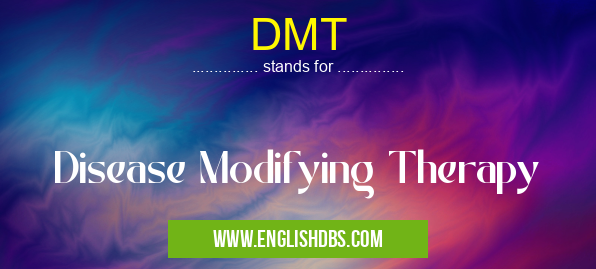What does DMT mean in THERAPY
In the context of medical treatment, DMT stands for Disease Modifying Therapy. It refers to therapeutic interventions that aim to alter the underlying disease process rather than simply managing symptoms. DMTs are typically used in chronic diseases where the goal is to slow down or halt the progression of the disease and improve the overall health and well-being of the patient.

DMT meaning in Therapy in Medical
DMT mostly used in an acronym Therapy in Category Medical that means Disease Modifying Therapy
Shorthand: DMT,
Full Form: Disease Modifying Therapy
For more information of "Disease Modifying Therapy", see the section below.
What does DMT Stand for?
DMT stands for Disease Modifying Therapy. It is a type of medical treatment that aims to modify the underlying disease process, rather than just treating the symptoms. DMTs are often used in chronic diseases, such as multiple sclerosis and rheumatoid arthritis.
How do DMTs Work?
DMTs work by interfering with the disease process at various stages. They may suppress the immune system, reduce inflammation, promote tissue repair, or alter the metabolism of the disease-causing agent. The specific mechanism of action depends on the type of DMT and the underlying disease.
Benefits of DMTs
- Slow down or halt disease progression: DMTs can help to slow down or even halt the progression of the underlying disease, which can improve the patient's quality of life and overall health.
- Reduce symptoms: DMTs can also help to reduce the symptoms of the disease, which can improve the patient's daily functioning and overall well-being.
- Improve long-term outcomes: DMTs can help to improve long-term outcomes for patients with chronic diseases, such as reducing the risk of disability and premature death.
Essential Questions and Answers on Disease Modifying Therapy in "MEDICAL»THERAPY"
What is Disease Modifying Therapy (DMT)?
Disease Modifying Therapy (DMT) refers to treatments aimed at altering the underlying disease process, rather than just managing symptoms. DMTs are commonly used for chronic or progressive diseases, such as multiple sclerosis (MS), rheumatoid arthritis (RA), and Crohn's disease.
How do DMTs work?
DMTs work by interfering with the immune system or inflammatory pathways involved in disease progression. They aim to slow or stop the deterioration associated with the disease, potentially preserving function and improving quality of life.
What are the different types of DMTs available?
There are various types of DMTs, each targeting specific biological mechanisms. Some common DMTs include:
- Immunosuppressants: These medications suppress the immune system to reduce inflammation.
- Biologics: These are proteins that directly target specific immune cells or molecules involved in the disease process.
- Immunomodulators: These medications alter the immune system's response without completely suppressing it.
Who is eligible for DMTs?
Eligibility for DMTs depends on the specific disease and its severity. Typically, DMTs are recommended for individuals with active disease or a high risk of disease progression. A healthcare professional will assess individual factors to determine the most appropriate treatment option.
What are the benefits of DMTs?
DMTs offer several potential benefits, including:
- Reduced disease activity
- Slower disease progression
- Improved quality of life
- Prevention of disability or organ damage
Are there any risks or side effects associated with DMTs?
As with any medication, DMTs can have potential side effects. These vary depending on the specific medication and individual patient. Common side effects may include:
- Increased risk of infections
- Gastrointestinal disturbances
- Injection site reactions
- Fatigue
How long do I need to take DMTs?
The duration of DMT therapy depends on the individual and the disease being treated. Some DMTs may be taken for a short period, while others may be required for long-term use. A healthcare professional will monitor the patient's response and adjust the treatment plan as needed.
Final Words: DMTs are an important part of the treatment for many chronic diseases. They can help to slow down or halt disease progression, reduce symptoms, and improve long-term outcomes.
DMT also stands for: |
|
| All stands for DMT |
